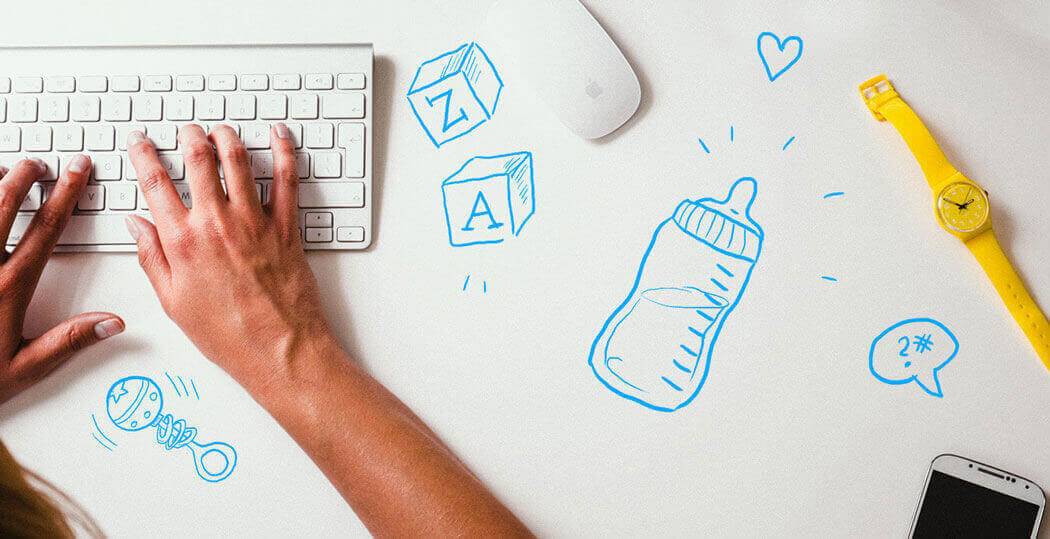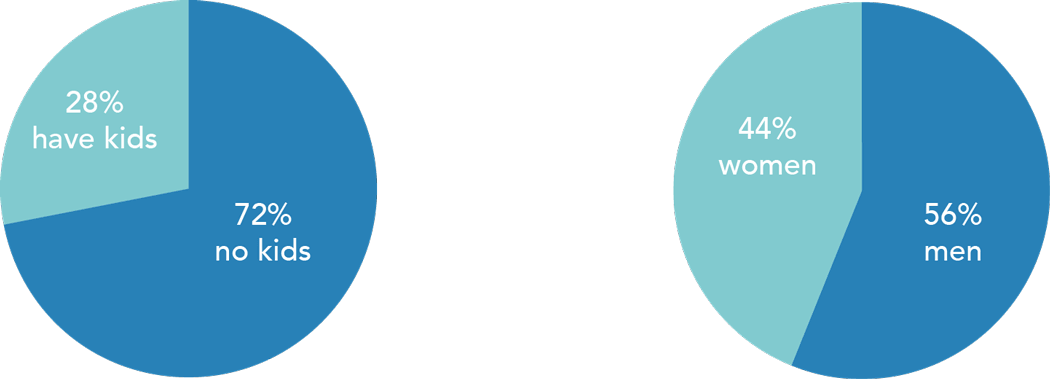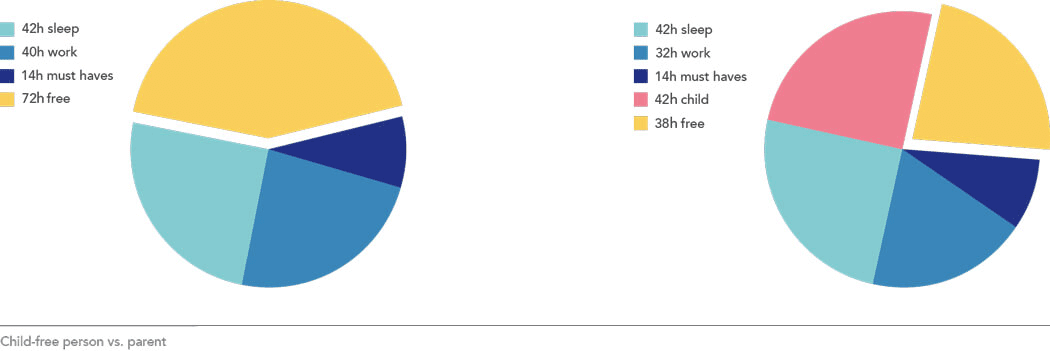Mum and Developer: Resolving life’s conflicts
This is not the type of blog post you expect to see from an IT company, is it? We are trying to become better engineers. We are trying to be a more successful organisation and the best possible workplace. We ramble on transparency, diversity, fairness, openness. We master cutting edge technologies. And yet, we often forget about something important. We know that diversity is good and important but we should learn how to look at our work from different perspectives. Today I invite you to see things from a mother’s point of view.

I originally published this post on our internal company blog. I wrote it six months after coming back to work from maternity leave and joining Lunar. I was inspired by many casual conversations with my coworkers, my friends and other mothers. It is personal but I decided to share this publicly because of the feedback I got like this comment: “This is an important topic and might be valuable for people to raise awareness about their colleagues, to better understand others, increase empathy”.
Companies = People
This post may not seem particularly related to our organisation. But the fact is that companies consist of people. Therefore, who people are and what they do outside of work influences the organisation. These are my thoughts on how motherhood and work interact. This may give you an idea of how a workplace changes when employee personal situations change.
Mother vs. Parent
At first, I wanted to give this post the title “Parent and Developer”, but after thinking about it, I felt unqualified talking from both mums’ and dads’ points of views. I do know something about the dad’s perspective (from my partner and other men) but I’ll let dads tell their own story.
Disclaimer: I don’t want to speak for all mothers. These are my own feelings and thoughts.
The Life Cycle of an Employee
This is a simplification but I divide employees by their stage of life into the following groups:
- Students - They are single, very often still at Uni. A paid job is just one of their many activities. They are very eager to learn, have almost infinite energy (slightly limited by hangovers and overdosing energy drinks) and time. They work irregular hours (due either to other commitments or their preferences). Their young bodies are productive despite the lack of sleep, poor diet and stimulants. They are not very experienced but make up for it with their eagerness and energy. They can commit to many hours of activities outside of work (both socialising and working/learning). Very often they still live with their parents or roommates and work is their only “serious” commitment.
- Young Independent Adults - They are young but after uni. They are starting to somewhat stabilise their lives. Many have partners and are living on their own. They still have quite a lot of energy and time but are starting to value their free time and health more - they are less eager to stay after hours or learn during the nights. But at this point, it is still just a matter of choice so still very often they decide to put more emphasis on their professional than on their private life.
- Young Parents - They have children and are in stable relationships with a well established work-life balance. Their lives are more organised. They work regular hours driven by their other commitments, mostly family ones. They can rarely stay after hours. They rarely spend their free time on work-related stuff. They are reliable and experienced but develop at a lower pace. They are more loyal to the company (meaning that they change jobs less frequently).
- Mature Parents - I haven’t got much experience with working with people at this stage, so I won’t try to define this group.
Often, one of these groups is a majority in a company. The majority group influences the values of the organisation, the way it works and the way it develops. Therefore, it is good to be aware and adjust your expectations.
Let’s have a look at our company’s statistics:

This means that the dominating group in Lunar is young independent adults but it could easily shift to the young parents in the foreseeable future.
If you’d like to know what an organisation with most of its employees in the 3rd group (young parents) can look like, think about how their life looks. Let me give you an idea based on my personal experiences.
Commitment vs. Option
Before having a child my life consisted mostly of options. I had a choice of how much I want to earn (in the worst case I could just live on the street as a hippie), where I want to live, how I want to spend my time and how much sleep I get.
Now, I really HAVE TO do some things (given that I don’t want to abuse or abandon my child, of course). So I (or my spouse) have to earn enough money to feed our child with more or less healthy food. I have to earn enough to keep him warm and healthy. I don’t have a lot of influence on how and when I sleep. I have to spend at least a few hours a day on things not related to work or my private matters.
I calculated how much time I spend weekly on different things I have to do (before and after I had a baby). Sleep, work, everyday “must haves” (like eating, hygiene and commuting). And the child: feeding, changing, bathing, putting to sleep and playing/quality time.

Therefore, it takes me approximately half of my “free” time to have a child. And, of course, sometimes it’s more, sometimes it’s less. I am also extremely lucky to have a partner that spends almost the same amount of time on the kid “must haves” as I do. Since we still want to meet sometimes, we do lots of the “must haves” together, even though theoretically we could do them separately and gain some free time.
So, I have approximately 38 hours a week to spend on whatever I want. How do I spend them?
Priorities and Choices
When making choices, I always ask myself about my priorities and how a given option aligns with them. And my priorities are:
- Family (child and relationship)
- Health
- Family (parents, siblings and others) and friends
- Professional development / Hobbies and personal development (these two change over time so I’m putting them together)
When I have a free hour or two, how do I spend it? Oh wait, family is at the top of my priorities, so I spend it with my kid or partner! Instead of reading a book, I cook a bloody healthy soup for my kid. I shop for organic tomatoes. Or, if I do read a book, it’s about how to raise a good kid instead of some relaxing or self-development read.
Next, for me having a healthy and good relationship with my partner is even more important after you have kids. Because constantly arguing and upset or divorced parents is probably not the best for the child and I want the best for him. I have to put conscious effort into my relationship to keep us both happy: be interested in what my partner does, do him small favours, spend time together (really together, not just in the same room).
Now, my family will not have much use for me if I’m tired or sick, so I need to keep myself healthy. I need physical activity and quality food for that. This takes time, too.
If I still have an hour or two of free time, my first choice would be to visit my parents, talk to my sister, meet my friends. I lived away from them for few years and I realised how easy it is to lose connection.
Miraculously, some weeks, I still happen to have 5-8 hours a week free. I’m usually so tired that I try to spend this time doing nothing, relaxing, thinking, reading. But also, very often, I try to learn something (like Spanish, 2,5 hours a week), cook or do something around the house that can’t be done when the kid is around.
Now, given all that you know about me and how I spend my time, consider:
- Will I commit a few hours a week to organise an IT event?
- I’m at the office, I’m tired and it’s hard to focus. I’d like to leave for home, take a nap and finish work in the evening. Oh wait, can I?
- Something hooked me in at work and I want to work longer hours to finish it or learn something. Will I?
- There is a great online course that can teach me new programming techniques in my free time, it takes 6-8 hours a week. Will I take it?
- There is an after-hours workshop in the company. Will I take part?
- I have an opportunity to get involved in an additional after-hours project which would let me learn a lot. It would take 15-20 hours a week. Will I do it?
- There is an evening IT meetup (very interesting). Going to it would mean that I will see my child only for 1 hour that day (during breakfast). Will I go?
I’m not saying I will decide this or that way every time, or that every mum/dad would make similar decisions. But from my experience of working in a company with lots of Young Parents and having friends with kids - well, for most of the people, most of the time, the answers would be “noes”.
What does it mean for a company with a lot of young parents like me? Here are a few thoughts:
Working Hours
I’d say that people with kids usually work more regular hours (forced by sleeping habits, nanny/nursery schedule etc.) and rarely do overtime. This has its pros and cons. It’s good because it enforces a good work-life balance and helps avoid burn out. It’s bad because it makes parents less flexible, and sometimes there is more work to do than other times. It may be valuable to work a little longer on one day and cut hours during a less busy time.
Generally, when you have kids you are more reliable but less flexible.
Discipline
Having so many things you HAVE TO do and limited time and energy really helps you to keep disciplined at work. You woke up in a bad mood and you’d prefer to stay in bed and relax or sleep in? Oh wait, you can’t. After going through the usual changing/feeding/washing/”keeping your child happy” routine, you are up and ready for work as good as always. Well, maybe more tired.
You lost inspiration to code and would like to spend an hour on Facebook and then stay at work a bit longer? Well, you won’t. You’ll do the bloody job the best you can so that you can run home or to pick up your child. You will because you have to.
Development
I had to come to terms with the fact that I won’t develop as fast as I did before. I just don’t have the time and energy to watch hours of videos, read books, craft pet projects etc. So if a company consists mostly of mothers with young children, there is a rather high probability it won’t become a cutting edge tech guru company any time soon.
There is another dimension to this too. Slower technical development doesn’t mean you don’t develop at all when you’re parenting. It triggers development of other skills, that in my opinion are also very valuable in the company context. Like discipline, mentioned above. Like the ability to focus in difficult conditions. Making fast decisions. Empathy. Patience. And many more, but this is material for a separate essay.
Comfort Zone
When you have fewer options and more commitments, you are forced to leave your comfort zone. And - surprise! - you don’t die when you do. And you can even have a smile on your face. And it’s even possible to not complain - in fact, you don’t even think about complaining! Take the lack of sleep: I remember the agony it used to be to work (and be happy) after not sleeping enough. Now, I never sleep enough. Literally, never. And it is still possible to work and be happy, because what are the alternatives? Getting upset constantly or quitting work?
Sometimes you’re not working on a dream project. It could even be really boring and frustrating. Well, I’ll tell you something. Breastfeeding for 4 hours straight can be really boring. It’s the next level of the boredom. Sitting for 1.5 hours next to the child’s bed so that he falls asleep and then accidentally waking him up a second later and having to spend an hour more in his room - that’s frustrating. Hey, that project doesn’t seem that boring and frustrating after all, I can make it.
These are just examples, but what I’ve learnt talking to many, many mothers and some fathers: you learn to accept the difficult things. And you don’t perceive it as a sacrifice, you accept it. Like the fact you are human and you can’t, let’s say, grow wings and fly. And sometimes, you think you can’t do it anymore, that it’s too hard. And yet, you still do, you keep going. And you don’t feel like a hero (Should you? Should all mothers? Or it is just normal, natural thing?).
Being a mum somehow makes you fearless and more aware of your boundaries (and how wide they are). Giving birth and taking care of a newborn shows you how you can do a really, really, really difficult thing without anyone teaching you how and with little support. And that failures (real, painful failures that result in crying, pain and fear) may be overcome. That making bad decisions hurts but teaches you a lot. And that you almost always have a second chance, so you have to try and try again. And give your best. And accept you are just good enough, never perfect.
Good choices. Good enough.
There is one more aspect which plays a big part in making decisions (about spending free time, choosing where to work and how much etc.). I call it “an eternal internal conflict”. As a mother, I’m almost never sure if the decision I’ve made was objectively good. I’m at work, developing my professional career, so I’m fulfilled and happy and I earn money. But shouldn’t I spend more time with my child, so he develops better, is happier and we have a stronger bond? Won’t I regret it in 10 years that I came back to work when my son was only a little over a year old?
I have some free time, so I watch some development or agile videos. But maybe, if I were a good mother, I would be making DIY Montessori toys for my son instead?
I want to watch an episode of a TV series with my boyfriend and I do, even though it’s after 10 pm. I improve my level of relaxation and my relationship. But maybe I should get some sleep so I’m not a zombie in the morning and can prepare a balanced and healthy breakfast for my child?
The problem is, you can ALWAYS do something better. And it applies to every domain, but this awareness is most painful regarding your children. And eventually, you learn to be just “good enough”.
